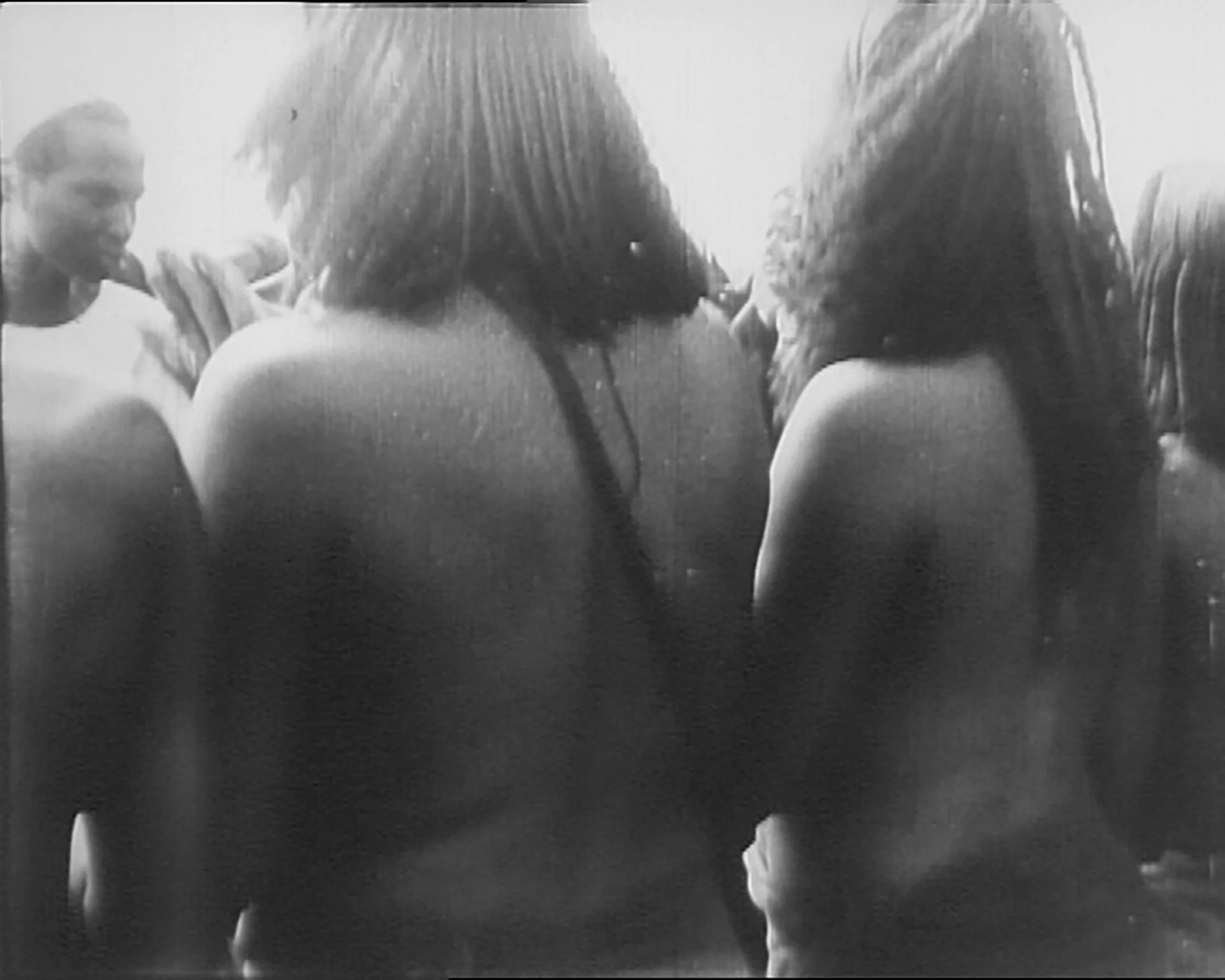From the Volcano to the Sea: The Feminist Group Le Nemesiache
‘Rassegna del Cinema Femminista’ organised by Le Nemesiache, Sorrento 1984, original photograph from the feminist film festival, photographer unknown. Courtesy Le Nemesiache and Mangiacapra Archive.
“WE DENOUNCE the violence which deprived ourselves of our bodies, of our expressions and of our extensions. CREATIVITY IS POLITICAL, it is life, routine, erotics, in harmony with nature and the cosmos.”
Le Nemesiache, 1977
Based in the southern Italian city of Naples, the feminist group Le Nemesiache was founded by artist Lina Mangiacapre in 1969 and was active throughout the 1970s and 1980s.The collective experimented with creativity and the arts as a route towards liberation and fulfilment within their daily lives, and to oppose the exploitation of the landscape surrounding the city.
Giulia Damiani, curator of From the Volcano to the Sea, leads a gallery tour, introducing Le Nemesiache’s collective practice through elements including textiles, costumes, films, documents, manifestoes, photographs and ephemera from a feminist film festival organised by the group in Sorrento from 1976-1995. Damiani shares memories and mythologies from the group and her encounter with them. Keeping with Le Nemesiache’s embodied practice of coming together to experiment and create disruptive feminist genealogies for the past and present – through a methodology which they called psicofavola (the psycho-fable) –, the event gestures towards story-telling and feminist transmission; it includes reflections on materials by the group and a collective reading of documents which will be activated with members of the Feminist Duration Reading Group from London, the team of Chelsea Space, and virtually with audiences of Mercer Union in Toronto.
The Event
The session includes a tour of the exhibition From the Volcano to the Sea and out loud readings of extracts from Le Nemesiache’s ‘If Within Several Ideologies One Part of Reality is Not Accounted For,’ (translated from Italian by Giulia Damiani).
There is no need to read texts in advance as we will read them together on the day.
Texts will be circulated to participants the day before. Please bring a hard or online copy with you.
EventBrite Registration
Giulia Damiani
Giulia Damiani is a writer, researcher, curator and performer based in London and Amsterdam. Since 2013 she has researched the artistic and political activity of the Naples-based feminist group Le Nemesiache, collaborating with the group and various artists. Damiani's research, which culminated in a PhD at Goldsmiths University in London in 2021, considers how Le Nemesiache's ritual and performative practice countered Western logic and its universalising concepts. Her performances and speculative writing have visited places such as the Temple of Mercury in Baia, the grotto of the Cumaean Sibyl near Naples and the volcanic areas of Vesuvius and Phlegraean Fields, proposing reinterpretations that combine mythic antiquity and future invocations.
Le Nemesiache
Founded by Lina Mangiacapre in 1969, the activity of Le Nemesiache was based on the ‘psycho-fable’, a consciousness raising method that led them to experiment with the body, myth and in relation to geomorphic elements to regain a sense of agency and belonging to reality.
Chelsea Space
Chelsea College of Arts
16 John Islip Street
London SW1P 4JU
www.chelseaspace.org
Access
Chelsea Space is wheelchair accessible. The gallery does not have an accessible toilet, but several are available on campus.
For Further Info
k.difranco@arts.ac.uk
Resonance and Transmission
This event is part of Resonance and Transmission, a multi-part events program organized by four curators, writers and researchers based in London, Montréal, Toronto, and Amsterdam interested in overlooked feminist histories and generational processes of knowledge transmission: Giulia Damiani, Gabrielle Moser, Vanessa Parent and Helena Reckitt. Informed by Aimée Zito Lema’s exhibition at Mercer Union, Toronto, which foregrounds her embodied entanglements with archival materials, the programme explores cultural and artistic responses to recorded histories, practices of appropriation, and corporeal memory, asking: What does it mean to resonate with a movement, an artist or an event? What does resonance mean and what does it permit? And what does it not attempt to do? How does resonance differ from appropriation? What is the role of the body in contacting, transmitting, remembering feminisms and other social movements?
www.mercerunion.org/exhibitions/forum-resonance-and-transmission/




